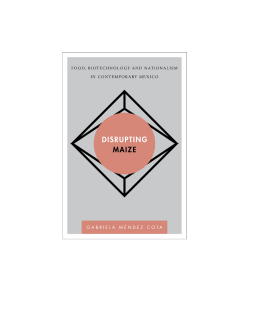
Additional Information
Book Details
Abstract
Disrupting Maize undertakes a critical interrogation of maize, the staple food and symbol of the Mexican nation. As the centre of origin and genetic diversification of maize, the Mexican territory is regarded today as being under threat of irreversible ‘contamination’ by genetically engineered maize, an imported biotechnological product. When the first evidences of such ‘contamination’ were found in 2001, an anti-GM movement was born that quickly became articulated as a defence of cultural identity and national sovereignty.
Disrupting Maize mobilizes contemporary theoretical resources in a critical examination of the cultural politics at work in the Mexican defence of maize. From such an examination ‘biotechnological disruption’ emerges provocatively as constitutive of Mexican nationalism rather than externally imposed to it by corporate players. Furthermore, it is provocatively conceptualized as a gift, that is, as the promise of a more democratic Mexico.
The problem is complex and the authors’ ideas are stimulating. There’s no doubt, as the history shows, that growing and eating maize became a political objective for Mexican postrevolutionary governments, and that a sacredness of maize was somehow crafted to achieve that goal.
Gabriela Méndez Cota is a post-doctoral researcher at Universidad Autonoma Metropolitana-Unidad Cuajimalpa.
Contamination is present in all sovereignty and identity is always necessarily transgenic. In the maize wars nationalist desire crosses biotechnical critique on its way to a posited refoundation that cannot know its limits and confuses its core. This fascinating book disrupts biological disruption itself while refusing to give in to endemic cultural moralisms. Its wager for democracy actively dislocates the compromised nostalgia of some emancipatory narratives while resisting the calculation of the future.
Alberto Moreiras, Texas A&M University
Disrupting Maize offers a detailed and innovative examination of the ways in which food both becomes heritage and a focus of political activism. In 2010, Mexican cuisine was added to UNESCO's list of intangible cultural heritage. Méndez Cota maps the complex and dynamic field of dissent and disagreements that challenged the nationalizing narrative represented by the listing. In doing so, she argues that diversity and dissent is an ongoing and integral aspect of intangible heritage. In illustrating the ways in which intangible heritage interconnects with disputes over knowledge production and biotechnological developments and applications the book provides a rare and sophisticated glimpse into the political and cultural complexity of 'living heritage’.
Laurajane Smith, Professor of Archaeology and Anthroplogy, Australian National University
Table of Contents
| Section Title | Page | Action | Price |
|---|---|---|---|
| Contents | 9 | ||
| Acknowledgments | 11 | ||
| Introduction | 15 | ||
| Chapter One: Mexican Maize | 27 | ||
| Chapter Two: Colonial Legacies, Constitutive Disruptions | 65 | ||
| Chapter Three: Resisting Technoscience | 99 | ||
| Chapter Four: The People of Maize and the Technoscience of Culture | 137 | ||
| Chapter Five: The Gift of Biotechnological Disruption | 173 | ||
| Index | 215 |
